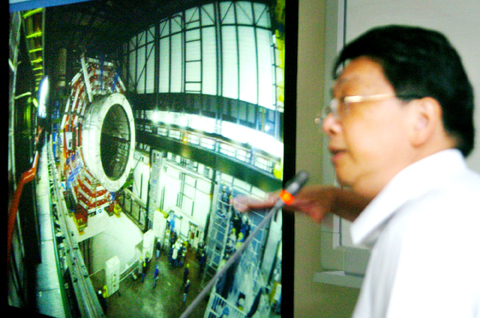Since 1999, Taiwan has helped fund the controversial Large Hadron Collider (LHC) in Europe by pumping approximately NT$400 million (US$12.6 million) into the project, the National Science Council said yesterday.
The experiment, organized by the European Organization for Nuclear Research (CERN), was designed to explore the interaction between basic particles in the universe, or what is known as the “standard model” in particle physics.
CERN is scheduled to circulate a beam through the entire LHC — located beneath the border between France and Switzerland — today at 3:30pm Taipei time. It plans to launch the first high-energy collision next month.

PHOTO: CHIEN JUNG-FONG, TAIPEI TIMES
Critics have said that the tremendous amount of energy released through the collision could create a black hole on the surface of the Earth.
The council said that over the past 10 years researchers from the Academia Sinica, National Central University and National Taiwan University (NTU) have joined scientists from around the world to work on two experiments related to the LHC project: A Toroidal LHC Apparatus (ATLAS) and Compact Muon Solenoid.
Bob Hsiung (熊怡), an NTU physics professor and one of the key researchers involved in ATLAS, said the two experiments will help target the Higgs particle, which many believe is the key to solving long-standing questions about mass.
He said the particle detector for ATLAS is 46m long and 25m tall, while that for CMS is 21m by 16m. The former weighs 7,000 tonnes, whereas the latter weighs 12,500 tonnes.
Hsiung said the collider would be kept at a temperature of minus 270°C once it begins to operate. The particle collision will create a temperature 1 billion times higher than the heat from the center of the sun, he said.
The LHC’s detectors, once in operation, are expected to generate 15 petabytes, or 15,000,000GB of data, annually. A live broadcast of the beam circulation will be broadcast online at lhc-first-beam.web.cern.ch/lhc-first-beam.

ALIGNED THINKING: Taiwan and Japan have a mutual interest in trade, culture and engineering, and can work together for stability, Cho Jung-tai said Taiwan and Japan are two like-minded countries willing to work together to form a “safety barrier” in the Indo-Pacific region, Premier Cho Jung-tai (卓榮泰) yesterday said at the opening ceremony of the 35th Taiwan-Japan Modern Engineering and Technology Symposium in Taipei. Taiwan and Japan are close geographically and closer emotionally, he added. Citing the overflowing of a barrier lake in the Mataian River (馬太鞍溪) in September, Cho said the submersible water level sensors given by Japan during the disaster helped Taiwan monitor the lake’s water levels more accurately. Japan also provided a lot of vaccines early in the outbreak of the COVID-19 pandemic,

Kaohsiung Mayor Chen Chi-mai (陳其邁) on Monday announced light shows and themed traffic lights to welcome fans of South Korean pop group Twice to the port city. The group is to play Kaohsiung on Saturday as part of its “This Is For” world tour. It would be the group’s first performance in Taiwan since its debut 10 years ago. The all-female group consists of five South Koreans, three Japanese and Tainan’s Chou Tzu-yu (周子瑜), the first Taiwan-born and raised member of a South Korean girl group. To promote the group’s arrival, the city has been holding a series of events, including a pop-up

TEMPORAL/SPIRITUAL: Beijing’s claim that the next Buddhist leader must come from China is a heavy-handed political maneuver that will fall flat-faced, experts said China’s requirement that the Dalai Lama’s reincarnation to be born in China and approved by Beijing has drawn criticism, with experts at a forum in Taipei yesterday saying that if Beijing were to put forth its own Dalai Lama, the person would not be recognized by the Tibetan Buddhist community. The experts made a remarks at the two-day forum hosted by the Tibet Religious Foundation of His Holiness the Dalai Lama titled: “The Snow Land Forum: Finding Common Ground on Tibet.” China says it has the right to determine the Dalai Lama’s reincarnation, as it claims sovereignty over Tibet since ancient times,

Temperatures in some parts of Taiwan are expected to fall sharply to lows of 15°C later this week as seasonal northeasterly winds strengthen, the Central Weather Administration (CWA) said today. It is to be the strongest cold wave to affect northern Taiwan this autumn, while Chiayi County in the southwest and some parts of central Taiwan are likely to also see lower temperatures due to radiational cooling, which occurs under conditions of clear skies, light winds and dry weather, the CWA said. Across Taiwan, temperatures are to fall gradually this week, dropping to 15°C to 16°C in the early hours of Wednesday